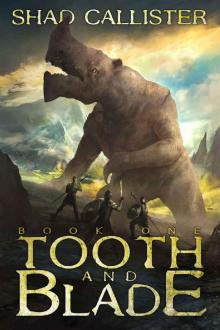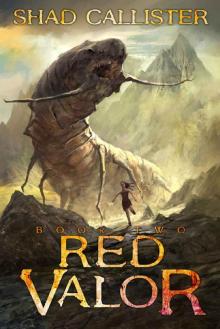- Home
- Shad Callister
Tooth and Blade
Tooth and Blade Read online
TOOTH
AND
BLADE
BOOK ONE
of the Tooth and Blade series
SHAD CALLISTER
Copyright © 2019 Shad Callister
All rights reserved.
Find out more
about this and other Barde Press titles at:
bardepress.com
Sign up to be notified of Shad’s next release
and get a Tooth and Blade Fan Pack containing bonus artwork from this series as well as three free stories and an expanded appendix.
DEDICATION
Let it be known among all the provinces of Kerath and throughout the territories across the sea, that the manuscript herein is dedicated to the high king's most devoted counselor Jennifer Priester, Muse of the Great Histories. May her person be ever guarded by Pellia's grace.
ACKNOWLEDGMENTS
In October 2018, these twenty-five backers helped bring this book to life. They are therefore duly accorded places of honor in the registry of his majesty’s list of nobles and advisors, forever.
Adam Dillon
Anna Price
Carmine Red
Christ van Willegen
Christine Baird
Curtis Deem
Fenric Cayne
Frederi Alderweireldt
Gerald P. McDaniel
Holly Bowers
Jennifer L. Pierce
Jennifer Priester
Jon Newlands
Joshua "Pokemancer" Kanapkey
Loretta Gase
LynnMarie Panzarino
Mark White
Mikael Monnier
Philip R. "Pib" Burns
Rafe Moran
Rupert Fuller
Sven
The Childs Clan
Wardog Montana
Yankton Robins
Table of Contents
CHAPTER 1: RED SAILS
CHAPTER 2: DANGEROUS CROSSROADS
CHAPTER 3: BLOOD DEBT
CHAPTER 4: OUTLAWS AND WORSE
CHAPTER 5: AN ALLY IN TIME OF NEED
CHAPTER 6: AN IRRESISTIBLE OFFER
CHAPTER 7: THE MAKING OF A COMPANY
CHAPTER 8: BANSHEECAT
CHAPTER 9: A CALL FOR KILLERS
CHAPTER 10: OPPORTUNITY ARISES
CHAPTER 11: A PLACE WORTH GUARDING
CHAPTER 12: THE INN AT LAST
CHAPTER 13: AGAINST A CUNNING FOE
CHAPTER 14: THE JAVELIN IS CAST
CHAPTER 15: BLOOD IS SPILT
CHAPTER 16: A TREE IS FELLED
CHAPTER 17: PLUNDERED PROVISIONS
CHAPTER 18: AND SOMEONE TO MANAGE THEM
CHAPTER 19: REST IS FOR CIVILIANS
CHAPTER 20: ONWARD TO RICHES
CHAPTER 21: TO GREENFIELD CAMP
CHAPTER 22: IN TELROS’ SERVICE
CHAPTER 23: BATTLE ON THE COAST
CHAPTER 24: BATTLE IN THE FOREST
CHAPTER 25: THE WORMS FEED
CHAPTER 26: RETREAT THROUGH THE WOODS
CHAPTER 27: AN OFFER OF FATE
CHAPTER 28: AMONG THE BARBARIANS
CHAPTER 29: A DUEL IN THE SAND
CHAPTER 30: BACK INTO THE FOREST
CHAPTER 31: A BREACH OF HONOR
CHAPTER 32: VICTORY OR DEATH
CHAPTER 33: A DARK FATE AVERTED
CHAPTER 34: BETTER THAN GLORY
CHAPTER 35: A CRUCIAL TURNING
Appendix
Map by Jessica Khoury
(refer to the appendix in the back of this book for helpful references such as a list of characters and troop roster, pantheon of gods mentioned, and calendars of Kerathi and Ostoran months)
CHAPTER 1: RED SAILS
Keltos absently rubbed his mare’s nose as he listened to the generals argue themselves into a killing rage.
Gull calls punctuated the sound of the breakers hissing on the strand, hard sounds on soft, but somehow seamless. At Keltos’ feet, the surf washed repeatedly over an abandoned helmet, a well-made bronze with flaring nasal and cheek guards. Watching the empty eyeholes slowly fill with wet sand saddened the young cavalryman, and he returned his gaze to the sea.
The ship captains added their own voices to the furious quarrel now, screaming about the tide and pointing vehemently at the storm clouds forming to the west. The generals ignored them, their own faces crimson, mouths opened wide to pour abuse onto each other.
All around them men struggled with horses, with each other, with barrels and crates, trampling the sand into a gritty gruel. Just west of the chaotic military assembly, the walls of Belsoria stretched along the shore, its gate closed.
Keltos gazed east, across the wide and changeless sea. There was something unearthly about it, so vast and somber. The gulls seemed to speak his name, inviting him to set forth upon the gray swells and return to the far sun-kissed plains of his birth. To come home. Kerath.
He looked down again at the fast-disappearing helmet. The dark eye sockets returned his gaze, reminding him. The trackless sea was many things. To Keltos, a barrier; to others, just a thing to cross.
There was no going back. Not for him. His life was here now, in Ostora. Here, or not at all.
Hetta, his mare, snorted and nuzzled at his ear. The dark-haired, deep-eyed soldier barely noticed. Let the sea be wide. Let it separate the two lands, he thought. The veil of water offered freedom to some. A fresh start from which he could not now turn away.
But still the sea beckoned. Let go of this place, it said, and forget its mysteries and dangers. Leave the Ostorans to their struggles. Or were those the words of one of the generals? Keltos lost track, waiting, holding Hetta on the edge of the surf as the argument raged on.
Keltos high-stepped, pulling his sandals free of the sucking sand, and backed Hetta a few steps inland to firmer ground. The rest of his troop, forty in all, milled nearby in disorganized ranks, their formation forgotten. Every man’s face was uneasy. Some busied themselves with their harness, pretending to be absorbed in the task, but they were all listening, waiting. The outcome of the quarrel would decide their fate.
Keltos tugged Hetta a few paces to his right and took a place next to his closest friend. Makos was his same age, six feet even, bronzed skin and dark hair in tight little curls much like himself. But where Keltos was slim and wiry, Makos was of stockier build and musculature that won every contest of strength between the two.
Makos shifted to make room for his comrade, and Keltos leaned close. “Which way does the tide turn?”
Makos muttered back. “Jaimesh wishes us to stay. The infantry are with him. But the cavalry commanders are split, and the charioteers are all for going back.”
Keltos nodded. It was an unbelievable mess that seemed to worsen by the hour. Rumors flitted back and forth among the ranks. The infantry tended to be more plebeian in their ranks and pragmatic in their direction; duty in the Ostoran colonies was an opportunity for them. The cavalry, however, especially the charioteers, were largely aristocratic and many of them found a prolonged stay this side of the sea repellent.
Still, there were some, like Captain Pelekarr, who had taken a liking to their post in the new land. The lack of royal oversight had allowed more than one canny officer to carve out a niche in Ostora. Some of the local barons got their start that way.
As Keltos listened to the shouting, he noticed that many of the officers remained silent, waiting to see which side gained support before speaking out. His own commander, Lord Jaimesh, was forcefully advocating a stand for Ostora. The venerable cavalry general’s honor and bloodline were unquestioned, but his defense of the colonists’ plight won him few friends among his fellow aristocrats.
“What of the settlers here?” he bellowed. “Are we to leave them at the merc
y of the barbarians and the creatures of the wilderness? They won’t last a year without us! What of the blood spilt to hold these lands? Is this the Kerathi army or a pack of craven curs?”
Keltos flushed with pride at his commander’s spirited appeal, but others shouted the general down.
“Traitor!” screamed Lord Iscabos, an influential chariot general. “Oath-breaker! Have you forgotten our duty to our sovereign and king? With war at home, every fighting man is needed. Defiance of his commands is treason. You would see the realm divided!”
“That is talk for cowards and fools!” retorted Lord Lakon, an infantry general of fearsome reputation. His troops had killed more barbarians than any other legion, and it was well known that he had taken an Ostoran wife. “No reliable word has reached us from the king! His Majesty has more than enough soldiers at home to put down whatever rebellion he faces. We are needed here, and anyone who says different is looking to their own ambition, not the good of the realm. Dogs and cowards are they who take ship! May the sea swallow them!”
On it went. Some of the junior officers were forced to physically hold their seniors back, to prevent them from drawing daggers and falling on each other. The ships were starting to rise and fall now, riding the swells like horses pulling at their tethers as cold waves rocked them from below and the wind pushed at the sails. They, like their masters, were eager to be off. The crews lined the decks and gunwales, waiting for somebody to give an order.
“So this is what a retreat looks like,” Makos said, disgusted. “Without a single enemy at our backs.” His mare, Brel, tossed her head behind him, yanking Makos’ arm holding the reins. He grunted and gave her ear a soft flick. “Be still, pretty one.”
One of their troopmates, Aslom Forta, turned his head to the dark line of trees that ran along a low bench a few miles inland, just visible past the walls of the port city. “Not at our backs, perhaps, but they are there. Hiding. Waiting to strike.”
“There’s not a barbarian within forty leagues of us.”
“At least we never saw defeat in battle,” said Keltos.
Makos snorted. “We never saw battle at all, Kel.”
“But we weren’t driven out,” Aslom insisted. “If we leave, we choose to leave. Heads high, honor intact.”
“Think again,” said Makos. “Soldiers do as they’re told, so no matter what happens we won’t be choosing anything. I like to think we’d have fought here until the last barbarian was dead. That’s what I signed up for. But one unconfirmed rumor of civil war in Kerath and the careerists panic—they’ll miss the chance of promotion! That’s why we’re on this beach.”
“What’s wrong with being noticed by the king and securing a promotion?” Aslom asked. “We all want the same thing. Quelling a rebellion back home is better than hunting raff tribesmen in Ostora.”
“I don’t care one way or the other,” Makos said. “I just think it’s mad to rush home on a rumor. We shouldn’t move until we know for sure.”
“By then the war could be over!”
“What if there is no war, or the conflict has already been snuffed out? We’d look like fools deserting our post.”
Keltos listened in silence. Makos had the right of it. The last merchant ships to arrive had indeed brought news of turmoil in the Kerathi homeland, but details were scarce. The ship captains swore it wasn’t true, but the sailors whispered that the high king was dead and his heir was fighting for his life against powerful opportunists. Maringon, a powerful eastern province, had rebelled before in the time of Keltos’ grandfather. Who could say which rumors had truth to them at a thousand leagues’ distance?
The silence from official channels had provoked this day’s bitter quarrel. No one knew for sure if the king needed them. On the one hand, the first ships arriving home to reinforce the king stood to gain honor and riches at the hands of a grateful ruler—if the silence was the result of desperate military circumstances.
On the other, if the Ostoran legions abandoned the colonies without good cause and sailed home for naught, they would be labeled deserters. King Anmar could be as vengeful as he was generous.
Ostora was fighting for its life against incursions from the barbarian raff and other brutal dangers inland. Without Kerathi troops, the Ostorans would stand virtually undefended. And despite sneering references to Ostora as a backwater, its raw resources fueled the kingdom: lumber, grain, and above all ore. Without the tin mines, bronze could not be made, and Anmar ruled with a bronze fist. Bronze was life.
Little wonder then, the flaring tempers of the chieftains. A right choice meant wealth and power undreamed of; a wrong choice meant death.
“We wait for orders, or we go not at all,” an infantry general named Brinar called out.
But the charioteers answered that if war had arisen, the enemy might send false orders to delay them. Such had happened before, they pointed out, during the Scarlet Summer rebellion. The Kerathi nobility were masters of deception and intrigue. It paid to be wary of tricks.
“They care nothing for false orders,” Makos whispered. “They care not who wins. They just want to be there so they can pick the winning side.”
Keltos nodded. He trusted his sergeants, and he trusted Captain Pelekarr and Lord Jaimesh. But no one else, least of all the chariot captains.
Lord Jaimesh was the heart and soul of the Cold Spears, a cavalry unit raised from Keltos’ and Makos’ home province of Tekelin. The general was a short man, wide and impossibly dense, a slab of meat with a mind singularly brilliant in the art and execution of war. Ironically, Jaimesh was a sloppy rider; he sat his horse like a sack of grain. But he was one of the kingdom’s great cavalry set-piece battle tacticians, and it was his brilliant success in the field that had attracted young Keltos Kuron and Makos Vipirion, among many others, to his banner.
Now that brilliant mind had decided that remaining in Ostora and defending the colony was the best course of action, and Keltos trusted his general. There was more to his confidence in the man than mere loyalty, however. For better or worse, Keltos was in Ostora now. He had no other home. A return to Kerath was not an option for him. Privately he prayed that the Cold Spears would remain in Ostora; otherwise he’d have to decide between desertion and imprisonment.
Suddenly, the shouting died down. The waves continued to wash across the beach, but a hush had fallen over the chieftains’ drama. Keltos saw with something close to panic that Iscabos had drawn his sword, and behind him his supporters had followed suit. Lord Iscabos was wealthy and renowned for his skill. His sword was iron, where the others brandished blades of bronze.
Keltos had seen officers quarrel before—even a couple of duels. But this looked ugly.
Lord Lakon stepped forward. “Put it away, Iscabos,” he murmured. “You have no enemy here.”
“No?” Iscabos’ voice was deceptively soft. “I serve the high king. Whom do you serve, Lakon? Say now, and be ready to stand by your words.”
“The same as you. We quarrel over how best to serve, not whom. Put it away.”
Iscabos looked left and right, assuring himself of support. Keltos saw Captain Pelekarr, who stood at Lord Jaimesh’s side, slowly drop his hand to his sword—careful, like he always was. All around, men were doing the same, straightening up and quietly making ready. Keltos heard Makos draw a slow, deep breath.
“Stand down, Iscabos,” Lord Lakon again intoned, getting a nod from Jaimesh and a few others. “Or I will see you arraigned before His Majesty.”
Lord Iscabos smiled.
Then he lunged. His iron blade swept up, and Lakon staggered backwards. Blood sheeted in the air.
There was an instant of silence as a thousand breaths sucked air and hands ripped swords from scabbards. As Lakon collapsed to the ground, both sides surged together with a feral roar.
Madness. The clang of bronze drowned the cries of the gulls and the thunder of the surf. Men screamed in rage and pain as bodies swirled and sand was trampled and kicked in sprays. The ship c
aptains, lacking a stake in the quarrel, fled back to their ships.
In the first moments of sudden violence, Keltos felt numb, weighted down by shock at seeing his own comrades falling upon each other. Beside him he heard Makos yelling. His friend had drawn his bronze saber, and now he rushed to the side of Captain Pelekarr. Horses were forgotten and left to wander in the melee. Keltos followed after his friend in a daze, pulling his own weapon free of its covering and swinging it at Iscabos’ men alongside Makos.
The captain, dutiful as always, was attempting to drag their general away from the fray, but Jaimesh was bull-strong and flailed his way forward into the press. Pelekarr quickly realized the futility of escape and resigned himself to defending his general. His sword soon stained itself crimson as he battled to keep Jaimesh clear. Jaimesh, for his part, strove to overtake Iscabos and avenge his murdered fellow general. Iscabos, surrounded by his staff, gave a shrill laugh.
Makos and Keltos fought their way as close as they could to Captain Pelekarr. Above the din, Makos called sharply to the captain. “Orders, sir?”
Pelekarr delayed a response just long enough to take an opposing charioteer’s arm off at the shoulder, then shouted over his shoulder. “Help me get the general out! Clear me a way!”
Keltos darted forward, Makos at his side, but they were too late. Even as they moved to flank the captain, a tall charioteer dressed in Iscabos’ livery with hair dyed at the tips grabbed Pelekarr’s armor from behind, hauling backward on the top of his backplate and sprawling his length on the sand. Men piled over the cavalry captain as other charioteers charged forward, smashing into the Cold Spears who sought to help their captain regain his feet.
Lord Jaimesh stood alone against Iscabos now, cutting wildly at his nemesis. His stroke went wide as the wily chariot general stayed back and waited. He saw what Jaimesh did not: Iscabos’ tall second in command, with another shorter charioteer who carried a cold sneer on his face, approaching Jaimesh from either side.

 Tooth and Blade
Tooth and Blade Red Valor
Red Valor Machines of Eden
Machines of Eden